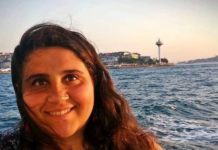Meryem Aşkara, a member of the pro-Kurdish Peoples’ Democratic Party (HDP), claimed she was beaten and threatened by special forces police who raided her house in southeastern Şırnak province yesterday, the Mezopotamya News Agency (MA) reported.
Police raided the house of Aşkara and her roommate Berivan Kutlu, the former Cizre co-mayor. Aşkara claimed that they were beaten for 20 minutes.
She said her ankles were sprained, her ribs bruised and she had difficulty walking and breathing. “The police broke down the doors and pointed their guns at us,” she claimed. “They told they would kill us if we made any sound.”
Aşkara added that two of the police officers took her to the balcony, where she screamed. She said her father and brother came up to check on her but that they were also beaten by the police.
According to Aşkara, the three policemen who raided her house had filed a complaint against her and her roommate claiming the women had assaulted them.
There have recently been several reports of police violence during house raids. Police officers used their dogs to terrify two Kurdish boys during a raid on their home in the southeastern province of Diyarbakır in October 2020.
The mother claimed the two boys were sleeping when the police broke down the front door and entered the house. They woke up, and the younger boy started crying because he was afraid of dogs. The police unleashed the dogs on the father and then hit him with the barrel of a gun when he tried to get the dog off himself. He was later taken to another room and beaten.
In a similar incident, Şeyhmus and Menice Yılmaz accused Diyarbakır police officers of letting their dogs attack them during a raid on their home on May 31, 2020 as part of an operation to find the suspected killer of police officer Atakan Aslan.
Following the incident, Şeyhmus Yılmaz went to Selahaddin Eyyubi State Hospital and got a medical report showing dog bites on various parts of his body. He later filed an official complaint alleging police brutality.
According to a report by the UN special rapporteur on torture and other cruel, inhuman or degrading treatment or punishment, on his mission to Turkey from November 27 to December 2, 2016, “torture and other forms of ill-treatment were widespread” in Turkey. “[T]here seemed to be a serious disconnect between declared government policy and its implementation in practice,” the special rapporteur noted.
The report found there were numerous consistent allegations received by the special rapporteur in the immediate aftermath of a failed coup on July 15, 2016 and that torture and other forms of ill-treatment were widespread, particularly at the time of arrest and during the subsequent detention in police or gendarmerie lock-ups as well as in improvised unofficial detention locations such as sports centers, stables and the corridors of courthouses.
The special rapporteur heard persistent reports of severe beatings, punches and kicking, blows with objects, falaqa, threats and verbal abuse, being forced to strip naked, rape with objects and other sexual violence or threats thereof, sleep deprivation, stress positions and extended blindfolding and/or handcuffing for several days, according to the report.
On the other hand, a report by the European Committee for the Prevention of Torture and Inhuman or Degrading Treatment or Punishment (CPT) based on its visit to Turkey’s detention centers in September 2016 has never seen the light of day because of a veto by Turkey.















